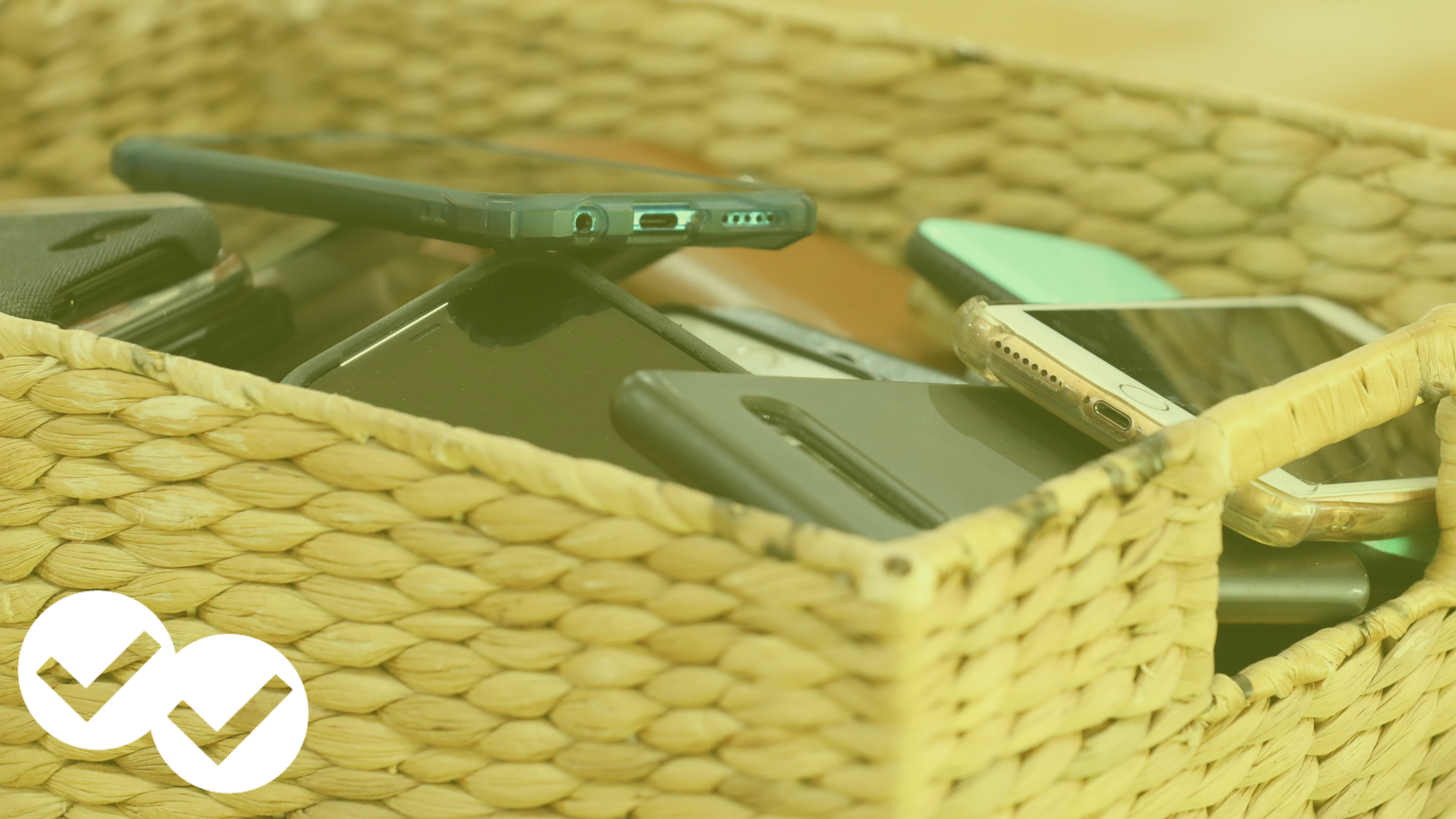
Ah, cell phones. Arguably one of the greatest blessings and curses of our lifetimes, right? While it's probably hard to imagine life without them at this point, and they're certainly invaluable in certain circumstances (especially smart phones -- hello GPS!), we all know how addictive and distracting they can be.
This is especially true when it comes to cell phones in classroom. The debate about cell phones in schools is raging, with many teachers divided on whether or not cell phones should be allowed on premise or in classrooms.
Are cell phones a distraction that greatly compromises learning? A valuable learning tool? An inevitability that we'll have to adapt to? Wherever you land on the debate, here is some of our best advice for managing cell phones in class.

Create a Cell Phone Policy that Works for Your Classroom
First of all, there may be a school-wide policy on cell phone use that you'll have to follow, so check on this before created a class policy. Provided you're able to create your own policy, take some time to reflect on what makes the most sense for your classroom specifically. Here are a few factors to consider:
- What subject do you teach? Is there any way that cell phone use could help contribute to reaching learning outcomes in this content area?
- What is the format of your class? Is it mostly lecture? Discussion? How much or little might cell phones get in the way of your teaching modalities?
- How many students do you have in class? If you have large or lecture-style classes, will students be more likely to misuse cell phones?
- What is your seating arrangement? Would it be easy or difficult for a student to cheat using a cell phone based on where they sit?
- What are your own values and beliefs surrounding cell phone use and rules in general? Do you believe restricting cell phone use may only encourage covert usage? Do you believe in a strictly cell phone free atmosphere for learning? Do YOU find it hard to stay off of your cell phone in certain environments or do you prefer to have access to it?
- How will you handle cell phone use if it's prohibited? Will the device be taken away? Will the student lose participation points for the day? Will different types of use (e.g. cheating vs. silencing a phone call) be handled differently and carry different consequences?
- How does educational equity and accessibility factor into your decision? For example, do ALL of your students have access to smart phones and if not, will the ones who do not be at a disadvantage for not having one? Consider the demographics of your student body and to what extent cell phones play a role in fostering educational equity.
Once you've decided on a cell phone policy, you'll want to communicate it as clearly and directly as possible to both students and parents/guardians both verbally and in writing. You may even want to consider assigning a class contract regarding cell phone use that students sign to hold them accountable for inappropriate use.
Encourage Reflection on Cell Phone Use

It's easy to get frustrated about cell phone use in class and instinctively jump to scolding when it does happen. But here's the thing: depending on where you teach and what grade you teach, there's a good chance that most or all of your students will have a cell phone, and that they will be very accustomed to having it in their hands -- just like you! (Especially if they've been attending school virtually up until recently!)
Try opening up a friendly class discussion about cell phone or assigning a journal prompt about it. Ask your students if THEY feel cell phones are a distraction and if they feel too tempted to use them. Encourage honesty and genuine inquiry. Consider letting them help you decide on and develop the cell phone policy, trusting that they are good advocates for themselves and may be more likely to follow a policy they helped develop.
You can also ask your students if there are any ways that cell phones have become valuable learning tools for them and why they might be more comfortable being allowed to hang onto their cell phones in class. And be encouraged to ask them broader questions about their feelings about cell phones in general: what about cell phones causes stress? What about cell phones makes them feel safe?
Having a sense of your students' feelings about cell phone use will help develop a classroom culture rooted in open communication and help you shape your policy accordingly.
Use a Storage or "Flag" System for Cell Phone Use
If you're going to allow cell phones in your classroom (as opposed to a zero-tolerance policy that involves leaving them in their locker or similar), how will you handle the logistics? Will you require students to store their cell phones somewhere like in a group bin or in a pouch on the side of their desk to be used only with permission or in the case of an emergency?

If you're feeling a bit more flexible than that, you could consider using some type of coding or flagging system for your classroom depending on the day (think about different colored beach flags to indicate swimming conditions).
For example, depending on your curriculum on a given day, maybe you put up a red "flag" of some sort to indicate that today will be a strictly "no cell phone" day and that students will be required to store them until the end of class. On another day, you may put up a yellow "flag" to indicate the cell phones can be out on students' desks but placed face-down and only used with permission. And on yet another day, you may put up a "green" flag that indicates that cell phones can be used freely in relation the work assigned so long as it is completed in a timely manner and students stay on task.
Obviously you can shift the parameters and implementation of these ideas, but there are definitely ways to get creative with communicating expectations about cell phone use in class.
Incorporate Cell Phones into Curriculum
Plenty of teachers have actually found that cell phones can be powerful learning tools, depending on the curriculum at hand. Here are just a few of the many ways cell phones can be used productively in class to foster more meaningful and engaged learning:
- As calculators
- As assignment notebooks/calendars to help students keep track of their homework and schedules
- As research or polling tools
- As a way for students to check their grades and stay privy to their performance in class
- As a dictionary/thesaurus
- As a digital reader for class texts
- As a news source
- As an outlet for valuable secondary sources: videos, podcasts, etc.
- As drafting tools for written assignments (Google docs, notepad, etc.)
- As a collaborative tool for group or partner work: quizzes, test prep, etc.

To encourage responsible cell phone use, you may even make some of your curriculum digital or utilize digital platforms that all of your students can access.
Be Willing to Evolve
For better or worse, cell phones are here to stay and will presumably only get "smarter" and more integral to all of our lives. Your relationship to cell phones in your classroom will likely be more complicated than simply "no phones allowed" and will warrant some deep and meaningful reflection on what makes the most sense in context. And as technology evolves, remember to stay open-minded and willing to update your policies accordingly. Happy planning and good luck!

